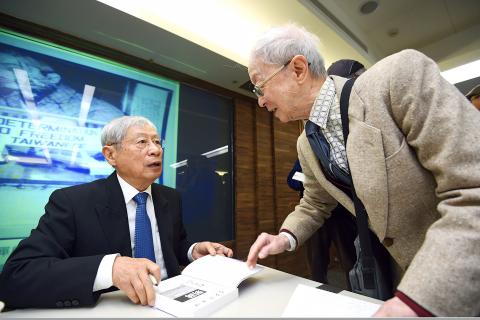The government should demolish any memorials that are reminiscent of the Chinese Nationalist Party’s (KMT) past autocracy, including the Chiang Kai-shek (蔣介石) Memorial Hall in Taipei, Taiwanese architect Cheng Tzu-tsai (鄭自才) said yesterday at a book launch in Taipei.
Cheng introduced his memoir about the failed assassination of then-deputy premier Chiang Ching-kuo (蔣經國) in New York on April 24, 1970, while the pan-blue camp was commemorating the 30th anniversary of Chiang’s death at a separate event yesterday.
The assassination attempt was planned and executed by Huang Wen-hsiung (黃文雄), who is Cheng’s brother-in-law, with Cheng as a collaborator.

Photo: Chien Jung-fong, Taipei Times
However, the attempt failed and the two were detained by police on the spot.
“As the assassination attempt took place about 50 years ago, many people nowadays do not know about it,” Cheng said. “Hopefully, this book can help expedite the nation’s realization of transitional justice.”
The memoir, titled To Kill a Dictator: The Attempted Assassination of Chiang Ching-kuo, was coauthored by Cheng and Alliance for Justice in Educational Transformation secretary-general Chang Wen-lung (張文隆).
The authors discuss vignettes in Taiwanese history from 1936 to 1974, including Taiwanese independence movements in the US, the assassination plan, Cheng’s imprisonment in the US and the UK, and his political asylum in Sweden.
Cheng’s memoir ends when he was released on parole from a US prison on Nov. 25, 1974, and left for Sweden to be reunited with his family.
“The perpetrators of political crimes during the White Terror era should undergo legal trials and punishment,” Cheng said.
“The Chiangs’ ghosts linger in Taiwanese society,” which is why former president Ma Ying-jeou (馬英九) and others still worship them, he said.
“The nation cannot become truly free and democratic if its transitional justice is not realized,” he said, calling on the government to demolish the Chiang Kai-shek Memorial Hall and other symbols of the KMT’s dictatorship.
By introducing the endeavors of Huang and Cheng, Chang said he hopes the book could incite desire to fight for Taiwanese independence.
Documentation about Taiwanese history has largely been based on KMT propaganda that supports a “one China” principle, while the nation needs more historical texts that reflect the truth, said US political activist Linda Gail Arrigo, who was the English-language translator of the book summary.

Intelligence agents have recorded 510,000 instances of “controversial information” being spread online by the Chinese Communist Party (CCP) so far this year, the National Security Bureau (NSB) said in a report yesterday, as it warned of artificial intelligence (AI) being employed to generate destabilizing misinformation. The bureau submitted a written report to the Legislative Yuan in preparation for National Security Bureau Director-General Tsai Ming-yen’s (蔡明彥) appearance before the Foreign Affairs and National Defense Committee today. The CCP has been using cognitive warfare to divide Taiwanese society by commenting on controversial issues such as Taiwan Semiconductor Manufacturing Co’s (TSMC, 台積電) investments in the

HELPING HAND: The steering committee of the National Stabilization Fund is expected to hold a meeting to discuss how and when to utilize the fund to help buffer the sell-off The TAIEX plunged 2,065.87 points, or 9.7 percent, to close at 19,232.35 yesterday, the highest single-day percentage loss on record, as investors braced for US President Donald Trump’s tariffs after an extended holiday weekend. Amid the pessimistic atmosphere, 945 listed companies led by large-cap stocks — including Taiwan Semiconductor Manufacturing Co (TSMC, 台積電), Hon Hai Precision Industry Co (鴻海精密) and Largan Precision Co (大立光) — fell by the daily maximum of 10 percent at the close, Taiwan Stock Exchange data showed. The number of listed companies ending limit-down set a new record, the exchange said. The TAIEX plunged by daily maxiumu in just

INVESTIGATION: The case is the latest instance of a DPP figure being implicated in an espionage network accused of allegedly leaking information to Chinese intelligence Democratic Progressive Party (DPP) member Ho Jen-chieh (何仁傑) was detained and held incommunicado yesterday on suspicion of spying for China during his tenure as assistant to then-minister of foreign affairs Joseph Wu (吳釗燮). The Taipei District Prosecutors’ Office said Ho was implicated during its investigation into alleged spying activities by former Presidential Office consultant Wu Shang-yu (吳尚雨). Prosecutors said there is reason to believe Ho breached the National Security Act (國家安全法) by leaking classified Ministry of Foreign Affairs information to Chinese intelligence. Following interrogation, prosecutors petitioned the Taipei District Court to detain Ho, citing concerns over potential collusion or tampering of evidence. The

‘COMPREHENSIVE PLAN’: Lin Chia-lung said that the government was ready to talk about a variety of issues, including investment in and purchases from the US The National Stabilization Fund (NSF) yesterday announced that it would step in to staunch stock market losses for the ninth time in the nation’s history. An NSF board meeting, originally scheduled for Monday next week, was moved to yesterday after stocks plummeted in the wake of US President Donald Trump’s announcement of 32 percent tariffs on Taiwan on Wednesday last week. Board members voted to support the stock market with the NT$500 billion (US$15.15 billion) fund, with injections of funds to begin as soon as today. The NSF in 2000 injected NT$120 billion to stabilize stocks, the most ever. The lowest amount it